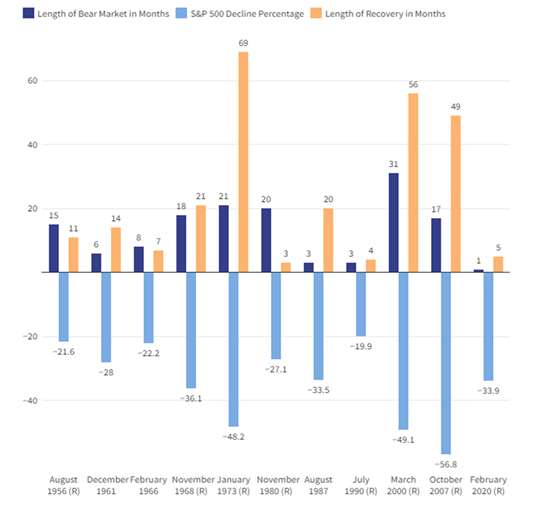Being in the midst of a sharemarket sell-off, the term ‘bear market’ is often commented on within the media. But what is a ‘bear market’?
An equity market is determined as being in a ‘bear market’ when the market index falls by 20% or more from its most recent high.
Bear markets are often a result of economic events which can stem from market bubbles bursting, pandemics, contractionary monetary policy, recessions and rising unemployment. It is hard to see when a bear market is coming, due to not being able to determine when stock prices have peaked.
A bear market can last for a varied time period, from several weeks to several years, depending on the reason and the severity. However, on average they tend to last just over nine months.
The alternative to a ‘bear market’ is called a ‘bull market’, which, like a bear market, can last a few months to several years, but on average they tend to be much longer than bear markets, with the average bull market 2.7 years in length. Over the past 91 years, sharemarkets have experienced a bull market 78% of the time, compared to only 22% for bear markets.
The last bear market that was experienced in Australia was February 2020 in response to COVID-19, where the share market plunged (-33.92%). The bear market was incredibly short, lasting just 33 days.
A number of techniques can also be used to minimise the effects borne by investors. Investing in companies that can tolerate a recessionary environment, along with using a diversified portfolio across a range of sectors and asset classes, such as bonds and cash, can help to reduce the volatility that comes with a bear market. History also shows that sectors such as Consumer Staples, Health Care and Utilities usually remain more stable throughout economic downturns. This is due to their structural nature, where cutting spending on food, health care, water and electricity becomes much harder than reducing expenditure on more discretionary items.
While bear markets are painful and can cause angst for investors to go through, investors can take comfort that they are shorter in nature and are followed by the next bull market.

Cutcher's Investment Lens | 7 - 11 April 2025
The failed $3 million super tax: Division 296 is done… or is it?
Cutcher's Investment Lens - Update on Trump & Tariffs | 31 March - 4 April 2025
Liberation Day - April 2025 Snapshot
Smart investing for SMEs: The basics on how to get started and grow your business.




